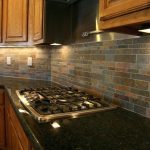To seal or not to seal, that’s an important question when installing natural stone tile. Stone and brick tiles and veneers are used more often in Madison WI projects. Therefore the question comes up more often. When the answer is yes, seal the tile, the next question is which tile sealant is best.
In a DIY project, a homeowner may not even consider whether or not to use a sealant. Professional installers know when sealing makes sense and which products work best.
Knowing when a sealer is necessary depends upon where the tile is and what’s around it. A rule of thumb is that whenever natural stone tile or veneer is used outside it should be sealed. In addition, anywhere there’s a possibility of moisture – like a shower wall or laundry room floor – a tile sealant is a must.
Sealing stone tiles and veneers serves two purposes:
- Preventing discoloration
- Reducing maintenance
Some kinds of stone, like slate, have a high iron content and actually rust when they get wet too often. Others oxidize and show mineral streaks or stains. Sealing the stone doesn’t prevent the problem entirely, but minimizes it. As a layer of protection, the tile sealer also makes cleaning the surface easier because spills won’t penetrate the stone.
Selecting A Tile Sealant
Some stones absorb moisture fast and some don’t. The ones that take in the moisture quickly need the protection of a sealer. If you’re not sure where the stone tile you selected fits, try this simple test:
- Place several drops of water on the surface of the stone
- Time how long it takes for the water to completely disappear

In a kitchen where spills, splashes and splatters are likely, the right sealant keeps this stone protected and looking like new.
If the water is gone in a minute or less the stone is very porous. If it takes 3-4 minutes it is porous. More than 4 minutes is slightly porous. When you’re done you’ll know if you need a sealant and what kind you need.
There are two kinds of sealers commonly used: water-based and solvent-based. Generally, water-based products are easier to use. In addition there are both penetrating and coating tile sealing products. Penetrating versions are absorbed into the stone and coatings bond with the surface.
Penetrating sealers provide the best moisture protection for wet areas. Another advantage is that they seldom change the appearance of the stone. Coatings give the stone a sheen and may affect color.
When choosing a tile sealant, consider:
- Some sealers make stone look wet, others make it appear vibrant and others darken the surface.
- The more porous the natural stone tile, the more coats you have to apply.
- Not every sealer works with every type of stone – check with a professional before you apply
- Sealing isn’t permanent, additional applications will likely be required. How often depends upon the location, type of stone and type of sealant.
Is Sealing Natural Stone Tile A DIY Project
It’s easy to say, “I can do that.” But do you have the tools? Do you have the skill? If you make a mistake, who fixes it?
Sealant applied wrong is a problem. Before considering taking on the job of sealing stone or brick tiles keep in mind:• The surface must be completely clean. If not, you seal in dirt, dust and debris.
- Old sealer must come off before applying a new one – sealants fill pores and coat exposed minerals. Residual sealer from a previous job causes a poor bond resulting in haze on the stone when it dries.
- Once completely dry redoing the job is a major project.
- Different sealants perform differently depending upon the stone and the surrounding environment – are you sure you have the best match?
Tap A Pro
A tile professional has the right tools to make the job smooth and efficient. And a pro knows the shortcuts that work and those that are more trouble than benefit.
For professional consultations, innovative tile creations, installation and selection, contact Molony Tile. We’re Madison’s premier source for unique, durable and elegant tile solutions. Call or email Molony Tile, 608-268-8453 to discuss professional tile sealant choices suited to the natural stone in your Madison WI home.

